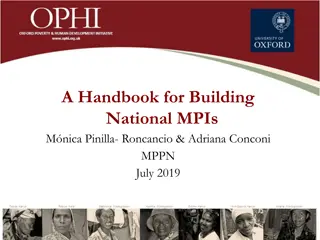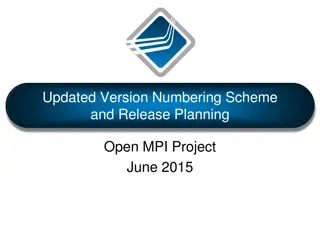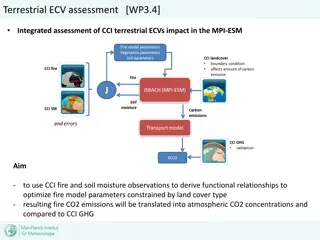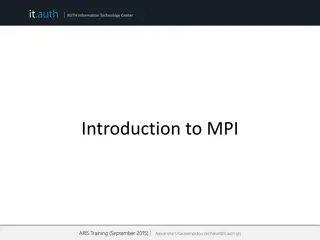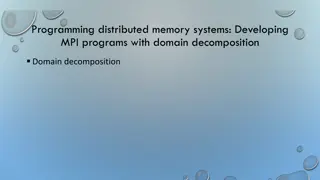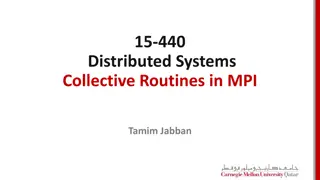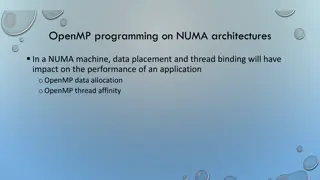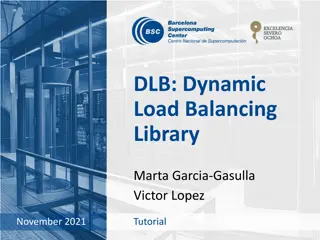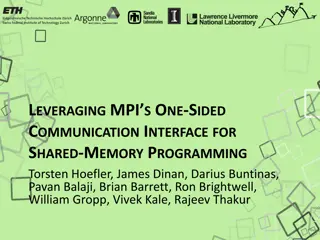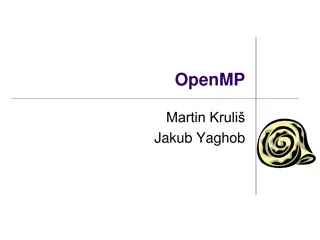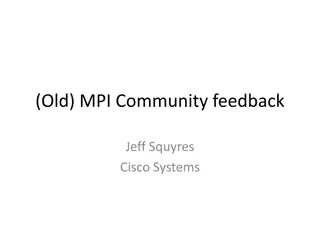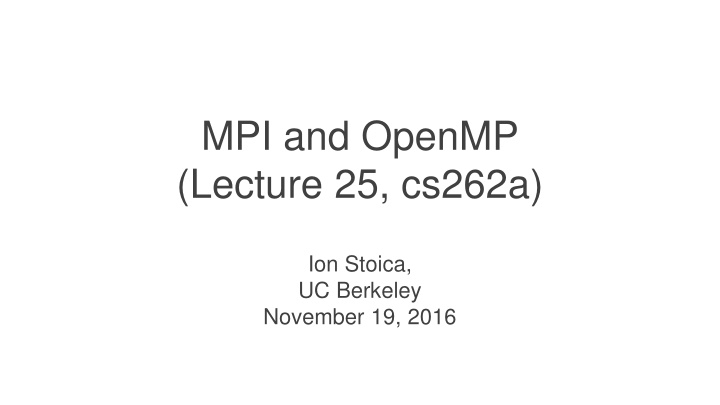
MPI and OpenMP Concepts for Parallel Computing
Explore the differences between message passing and shared memory in parallel computing, the architecture types like UMA and NUMA, and the significance of MPI as a standard for creating parallel programs. Delve into communication groups, contexts, and modes for effective parallel programming.
Download Presentation

Please find below an Image/Link to download the presentation.
The content on the website is provided AS IS for your information and personal use only. It may not be sold, licensed, or shared on other websites without obtaining consent from the author. If you encounter any issues during the download, it is possible that the publisher has removed the file from their server.
You are allowed to download the files provided on this website for personal or commercial use, subject to the condition that they are used lawfully. All files are the property of their respective owners.
The content on the website is provided AS IS for your information and personal use only. It may not be sold, licensed, or shared on other websites without obtaining consent from the author.
E N D
Presentation Transcript
MPI and OpenMP (Lecture 25, cs262a) Ion Stoica, UC Berkeley November 19, 2016
Message passing vs. Shared memory Client Client Client Client send(msg) recv(msg) send(msg) recv(msg) MSG MSG Shared Memory MSG IPC Shared memory: all multiple processes to share data via memory Message passing: exchange data explicitly via IPC Applications must locate and and map shared memory regions to exchange data Application developers define protocol and exchanging format, number of participants, and each exchange
Architectures Uniformed Shared Memory (UMA) Cray 2 Non-Uniformed Shared Memory (NUMA) SGI Altix 3700 Massively Parallel DistrBluegene/L Orthogonal to programming model
MPI MPI - Message Passing Interface Library standard defined by a committee of vendors, implementers, and parallel programmers Used to create parallel programs based on message passing Portable: one standard, many implementations Available on almost all parallel machines in C and Fortran De facto standard platform for the HPC community
Groups, Communicators, Contexts Group: a fixed ordered set of k processes, i.e., 0, 1, .., k-1 Communicator: specify scope of communication Between processes in a group Between two disjoint groups This image is captured from: This image is captured from: Writing Writing Message Passing Parallel Programs Message Passing Parallel Programs with with MPI , MPI , Course Notes Course Notes, Edinburgh Parallel Computing Centre The University of Edinburgh Context: partition communication space A message sent in one context cannot be received in another context
Synchronous vs. Asynchronous Message Passing A synchronous communication is not complete until the message has been received An asynchronous communication completes before the message is received
Communication Modes Synchronous: completes once ack is received by sender Asynchronous: 3 modes Standard send: completes once the message has been sent, which may or may not imply that the message has arrived at its destination Buffered send: completes immediately, if receiver not ready, MPI buffers the message locally Ready send: completes immediately, if the receiver is ready for the message it will get it, otherwise the message is dropped silently
Blocking vs. Non-Blocking Blocking, means the program will not continue until the communication is completed Synchronous communication Barriers: wait for every process in the group to reach a point in execution Non-Blocking, means the program will continue, without waiting for the communication to be completed
MPI library Huge (125 functions) Basic (6 functions)
MPI Basic Many parallel programs can be written using just these six functions, only two of which are non-trivial; MPI_INIT MPI_FINALIZE MPI_COMM_SIZE MPI_COMM_RANK MPI_SEND MPI_RECV
Skeleton MPI Program (C) #include <mpi.h> main(int argc, char** argv) { MPI_Init(&argc, &argv); /* main part of the program */ MPI_Finalize(); } /* Use MPI function call depend on your data * partitioning and the parallelization architecture */
A minimal MPI program (C) #include mpi.h #include <stdio.h> int main(int argc, char *argv[]) { MPI_Init(&argc, &argv); printf( Hello, world!\n ); MPI_Finalize(); return 0; }
A minimal MPI program (C) #include mpi.h provides basic MPI definitions and types. MPI_Init starts MPI MPI_Finalize exits MPI Notes: Non-MPI routines are local; this printf run on each process MPI functions return error codes or MPI_SUCCESS
Error handling By default, an error causes all processes to abort The user can have his/her own error handling routines Some custom error handlers are available for downloading from the net
Improved Hello (C) #include <mpi.h> #include <stdio.h> int main(int argc, char *argv[]) { int rank, size; MPI_Init(&argc, &argv); /* rank of this process in the communicator */ MPI_Comm_rank(MPI_COMM_WORLD, &rank); /* get the size of the group associates to the communicator */ MPI_Comm_size(MPI_COMM_WORLD, &size); printf("I am %d of %d\n", rank, size); MPI_Finalize(); return 0; }
Improved Hello (C) /* Find out rank, size */ int world_rank, size; MPI_Comm_rank(MPI_COMM_WORLD, &world_rank); MPI_Comm_size(MPI_COMM_WORLD, &world_size); int number; if (world_rank == 0) { number = -1; MPI_Send(&number, 1, MPI_INT, 1, 0, MPI_COMM_WORLD); } else if (world_rank == 1) { MPI_Recv(&number, 1, MPI_INT, 0, 0, MPI_COMM_WORLD, MPI_STATUS_IGNORE); printf("Process 1 received number %d from process 0\n", number); } Tag to identify message Number of elements Rank of destination Default communicator Rank of source Status
Many other functions MPI_Bcast: send same piece of data to all processes in the group MPI_Scatter: send different pieces of an array to different processes (i.e., partition an array across processes) From: http://mpitutorial.com/tutorials/mpi-scatter-gather-and-allgather/
Many other functions MPI_Gather: take elements from many processes and gathers them to one single process E.g., parallel sorting, searching From: http://mpitutorial.com/tutorials/mpi-scatter-gather-and-allgather/
Many other functions MPI_Reduce: takes an array of input elements on each process and returns an array of output elements to the root process given a specified operation MPI_Allreduce: Like MPI_Reduce but distribute results to all processes From: http://mpitutorial.com/tutorials/mpi-scatter-gather-and-allgather/
MPI Discussion Gives full control to programmer Exposes number of processes Communication is explicit, driven by the program Assume Long running processes Homogeneous (same performance) processors Little support for failures, no straggler mitigation Summary: achieve high performance by hand-optimizing jobs but requires experts to do so, and little support for fault tolerance
OpenMP Based on the Introduction to OpenMP presentation: (webcourse.cs.technion.ac.il/236370/Winter2009.../OpenMPLecture.ppt)
Motivation Multicore CPUs are everywhere: Servers with over 100 cores today Even smartphone CPUs have 8 cores Multithreading, natural programming model All processors share the same memory Threads in a process see same address space Many shared-memory algorithms developed
But Multithreading is hard Lots of expertise necessary Deadlocks and race conditions Non-deterministic behavior makes it hard to debug
Example Parallelize the following code using threads: for (i=0; i<n; i++) { sum = sum + sqrt(sin(data[i])); } Why hard? Need mutex to protect the accesses to sum Different code for serial and parallel version No built-in tuning (# of processors?)
OpenMP A language extension with constructs for parallel programming: Critical sections, atomic access, private variables, barriers Parallelization is orthogonal to functionality If the compiler does not recognize OpenMP directives, the code remains functional (albeit single-threaded) Industry standard: supported by Intel, Microsoft, IBM, HP
OpenMP execution model Fork and Join: Master thread spawns a team of threads as needed Worker Thread FORK FORK FORK FORK Master thread Master thread JOIN JOIN JOIN JOIN Parallel regions
OpenMP memory model Shared memory model Threads communicate by accessing shared variables The sharing is defined syntactically Any variable that is seen by two or more threads is shared Any variable that is seen by one thread only is private Race conditions possible Use synchronization to protect from conflicts Change how data is stored to minimize the synchronization
OpenMP: Work sharing example answer1 = long_computation_1(); answer2 = long_computation_2(); if (answer1 != answer2) { } How to parallelize?
OpenMP: Work sharing example answer1 = long_computation_1(); answer2 = long_computation_2(); if (answer1 != answer2) { } How to parallelize? #pragma omp sections { #pragma omp section answer1 = long_computation_1(); #pragma omp section answer2 = long_computation_2(); } if (answer1 != answer2) { }
OpenMP: Work sharing example Sequential code for (int i=0; i<N; i++) { a[i]=b[i]+c[i]; }
OpenMP: Work sharing example Sequential code for (int i=0; i<N; i++) { a[i]=b[i]+c[i]; } #pragma omp parallel (Semi) manual parallelization { int id = omp_get_thread_num(); int nt = omp_get_num_threads(); int i_start = id*N/nt, i_end = (id+1)*N/nt; for (int i=istart; i<iend; i++) { a[i]=b[i]+c[i]; } }
OpenMP: Work sharing example Sequential code for (int i=0; i<N; i++) { a[i]=b[i]+c[i]; } Launch nt threads Each thread uses id and nt variables to operate on a different segment of the arrays #pragma omp parallel (Semi) manual parallelization { int id = omp_get_thread_num(); int nt = omp_get_num_threads(); int i_start = id*N/nt, i_end = (id+1)*N/nt; for (int i=istart; i<iend; i++) { a[i]=b[i]+c[i]; } }
OpenMP: Work sharing example Sequential code for (int i=0; i<N; i++) { a[i]=b[i]+c[i]; } #pragma omp parallel (Semi) manual parallelization { int id = omp_get_thread_num(); Increment: var++, var--, var += incr, var -= incr int nt = omp_get_num_threads(); int i_start = id*N/nt, i_end = (id+1)*N/nt; Comparison: var op last, where op: <, >, <=, >= for (int i=istart; i<iend; i++) { a[i]=b[i]+c[i]; } } One signed variable in the loop Automatic parallelization of the for loop using #parallel for #pragma omp parallel Initialization: var = init #pragma omp for schedule(static) { for (int i=0; i<N; i++) { a[i]=b[i]+c[i]; } }
Challenges of #parallel for Load balancing If all iterations execute at the same speed, the processors are used optimally If some iterations are faster, some processors may get idle, reducing the speedup We don t always know distribution of work, may need to re-distribute dynamically Granularity Thread creation and synchronization takes time Assigning work to threads on per-iteration resolution may take more time than the execution itself Need to coalesce the work to coarse chunks to overcome the threading overhead Trade-off between load balancing and granularity
Schedule: controlling work distribution schedule(static [, chunksize]) Default: chunks of approximately equivalent size, one to each thread If more chunks than threads: assigned in round-robin to the threads Why might want to use chunks of different size? schedule(dynamic [, chunksize]) Threads receive chunk assignments dynamically Default chunk size = 1 schedule(guided [, chunksize]) Start with large chunks Threads receive chunks dynamically. Chunk size reduces exponentially, down to chunksize
OpenMP: Data Environment Shared Memory programming model Most variables (including locals) are shared by threads { int sum = 0; #pragma omp parallel for for (int i=0; i<N; i++) sum += i; } Global variables are shared Some variables can be private Variables inside the statement block Variables in the called functions Variables can be explicitly declared as private
Overriding storage attributes private: int i; #pragma omp parallel for private(i) for (i=0; i<n; i++) { } A copy of the variable is created for each thread There is no connection between original variable and private copies Can achieve same using variables inside { } firstprivate: Same, but the initial value of the variable is copied from the main copy lastprivate: Same, but the last value of the variable is copied to the main copy int idx=1; int x = 10; #pragma omp parallel for \ firsprivate(x) lastprivate(idx) for (i=0; i<n; i++) { if (data[i] == x) idx = i; }
Reduction for (j=0; j<N; j++) { sum = sum + a[j]*b[j]; } How to parallelize this code? sum is not private, but accessing it atomically is too expensive Have a private copy of sum in each thread, then add them up Use the reduction clause #pragma omp parallel for reduction(+: sum) Any associative operator could be used: +, -, ||, |, *, etc The private value is initialized automatically (to 0, 1, ~0 )
#pragma omp reduction float dot_prod(float* a, float* b, int N) { float sum = 0.0; #pragma omp parallel for reduction(+:sum) for(int i = 0; i < N; i++) { sum += a[i] * b[i]; } return sum; }
Conclusions OpenMP: A framework for code parallelization Available for C++ and FORTRAN Based on a standard Implementations from a wide selection of vendors Relatively easy to use Write (and debug!) code first, parallelize later Parallelization can be incremental Parallelization can be turned off at runtime or compile time Code is still correct for a serial machine






